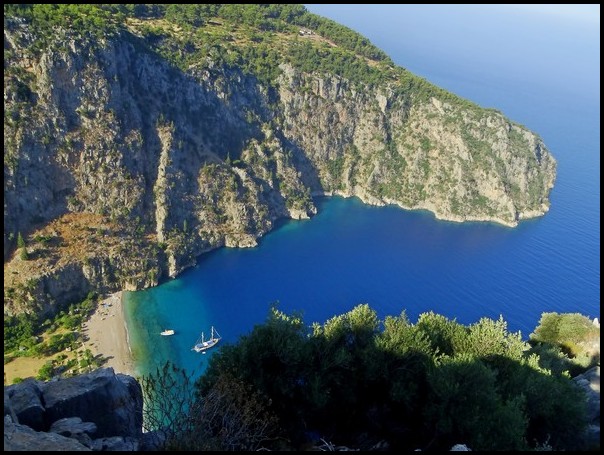 My 10 Best Experiences on Turkey’s Turquoise Coast
My 10 Best Experiences on Turkey’s Turquoise Coast
To date I’ve spent nearly five months exploring and living at Turkey’s gorgeous Turquoise Coast.
Initially I got ‘stuck’ in Antalya city for 10 weeks during Turkey’s loose Covid-19 lock-down. Eventually the lock-down measures were lifted so in early June I set out to explore more of the rugged coast between Antalya and Marmaris.
After landing in Fetiye a few weeks later, I loved the laid-back coastal city so much that I decided to base myself there while continuing to explore more gorgeous natural and archaeological spots on day trips from the city.
As the high tourist season unfolded in July and August along the entire coast, I gradually became ‘stuck’ in Fetiye as prices for accommodation elsewhere skyrocketed, as well as the temperatures
For some reason, Fetiye remained a few degrees cooler than all the other places I kept my eye on, and while it’s been really hot, it’s been manageable hot instead of crazy/dangerous hot most of the time.
At this point, it looks like I’ll have to just tough out the even-hotter August weather here since everywhere else I could go to in Turkey is even hotter! Up until recently (mid August) the temps were quite doable…
In the meantime, I’ve explored nearly every place on the Turquoise Coast that I was interested in, as well as several other spots I didn’t know about until learning more about the immediate Fetiye region.
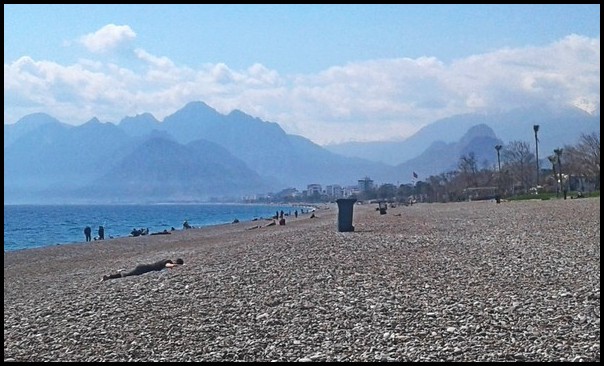 I count myself extremely lucky to have been stuck at Antalya and the Turquoise Coast during the horrible Covid-19 pandemic. Considering that I had to get ‘stuck’ some place in the world, just like everyone else on the planet, Turkey and particluarly this wonderful coastal region have been idyllic.
I count myself extremely lucky to have been stuck at Antalya and the Turquoise Coast during the horrible Covid-19 pandemic. Considering that I had to get ‘stuck’ some place in the world, just like everyone else on the planet, Turkey and particluarly this wonderful coastal region have been idyllic.
This section of Turkey’s long Mediterranean coastline is packed with gorgeous, dramatic & diverse natural features as well as many impressive archaeological sites and great cities & towns, many with adorable historic districts and beautiful natural settings.
After exploring the Turquoise Coast for nearly five months I’m still not bored with the region and am perfectly content to continue staying and re-visiting my favorite beaches, waterfront walkways and hikes until…? I eventually leave Turkey.
Meanwhile, following are my favorite experiences that I’ve had along the Turquoise Coast thus far:
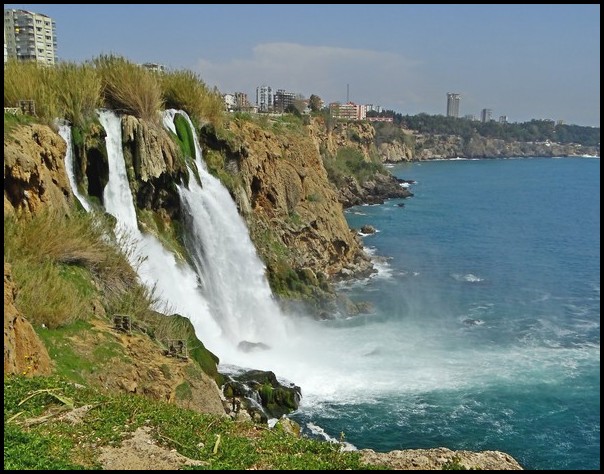 In Antalya
In Antalya
1. Marveling at Duden Waterfalls
It was a photo I saw online of the astounding Duden Waterfalls that had me hooked on visiting Antalya. I think it’s the first time I ever saw a waterfall plunging off a cliff into a sea. The fact that it’s located inside the city of Antalya just added to the ‘Wow Factor’.
Not surprisingly, one of the first things I did in Antalya was take a bus out to the suburban waterfalls. In real life the falls were even more spectacular than their photos. The stunning mass of water gushing over the cliff was accompanied by a massive, loud roar.
A large landscaped park has been built around the falls, making them even more attractive to visit. The river leading to the falls is quite narrow, so the huge volume of water races fast & furiously toward the cliff.
Just before the river plunges over the edge, there’s a wide wooden bridge traversing the narrow river so that visitors can stand ‘on top of’ the raging water, set back just a few meters from the razor-edge drop off. It’s quite spectacular.
The clifftop parkland on either side of the falls provides plenty of diverse vistas of the stunning falls and coastline. So it’s fairly easy to photograph the spectacle from land, without having to board a boat.
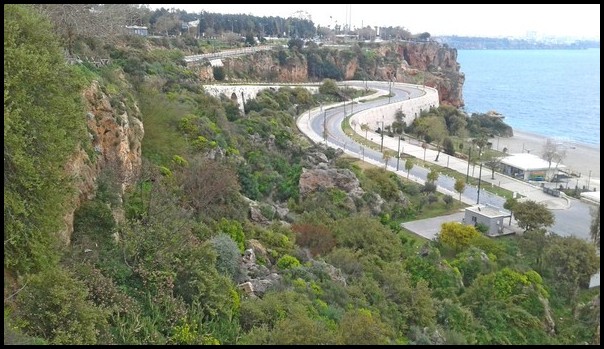 2. Walking in Antalya’s gorgeous parks
2. Walking in Antalya’s gorgeous parks
Antalya city has some absolutely gorgeous parks, most set along the city’s high coastal clifftops, which provide stunning views of the mountainous coastline stretching to the horizon.
Since I was ‘stuck’ in Antalya during the Covid-19 lock-down from late March to June, I had the very great fortune & pleasure of walking through those parks while they were more or less empty. Quiet. Peaceful. Full-nature experiences.
In truth, the parks were primarily empty because of the Covid lock-down, but also in part because I did my walking in mornings. I discovered soon after arriving in Turkey that the Turkish people tend to be on late schedules. It’s not until about 2 or 3 pm that city streets and public places start getting crowded and continue getting more jammed up as the evening unfolds. Mornings are generally pretty dead.
So simply by going out in mornings until mid afternoon, I could generally have the parks mostly to msyelf. It was just me and the many lovely stray cats who live in the parks.
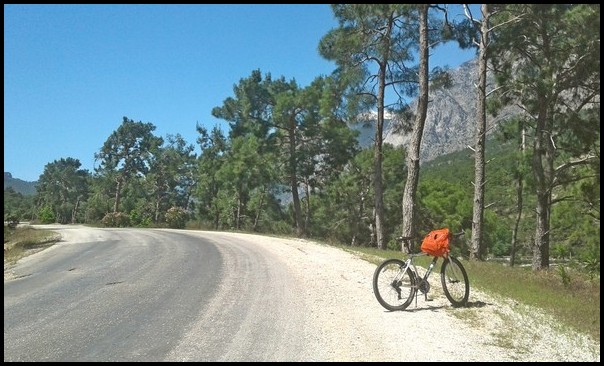 3. Cycling into Antalya’s Mountains
3. Cycling into Antalya’s Mountains
I was also incredibly lucky to land myself a bicycle to ride while staying in Antalya. When I realized I was going to be ‘stuck’ there for at least a few weeks, I asked my hotel staff & owner about acquiring a bike to use.
The very next day, voila, the owner showed up with a bike for me to use during my entire stay. Hooray!
Thanks to him I was able to explore the coast and mountains just outside the city. Generally 2-3 times a week I made a half-day cycling excursion out along the coastal highway heading north or out along several different local roads into the mountains.
I soon had a handful of favorite routes that I repeated several times. I generally cycled out 1-1.5 hours to one beautiful spot or other where I stopped for a picnic lunch, a brief afternoon nap and exploration of the area on foot before heading back into the city.
I discovered a fascinating boatyard where huge tour boats were being overhauled and a few even being built from scratch. Next to that marina was a small isolated pebble beach that I enjoyed a couple times.
On other days I hiked in a small narrow canyon, picnicked along a forested riverbed, found a few high perches in pine forests with stunning views of mountain peaks, discovered a loose windswept pine forest beside a wide, empty stony riverbed. I uncovered surprisingly colorful rocks in the riverbeds.
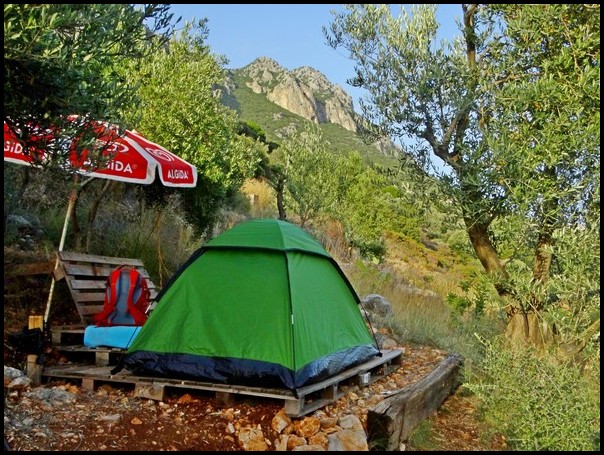
my campground in Kas
Along the Coast between Antalya and Fetiye
4. Camping at Kas
By the time I finally left Antalya to explore the coast in early June, prices for accommodation along the entire coast had begun rising drastically. In fact, they’d become so expensive that the only places I could afford were campgrounds! Lol.
Luckily, I love camping. So I promptly bought myself a nice little tent and set out to explore. The first place I visited was a small adorable historic coastal town called Kas.
Kas has a spectacular setting on a beautiful harbor backed by soaring bare rock mountains. There’s a super-cute historic town center as well as two scenic marinas and some very impressive Lycian archeaological sites.
I camped at a really stunning campground set in an olive grove on a hillside over-looking an upscale private yacht marina. It’s probably one of the most beautifully-designed campgrounds I’ve ever stayed at.
A series of curving walkways leads around the hillside through low olive trees, where a few dozen wood platforms have been placed for campers to pitch their tents.
The only drawback was the roaring traffic passing by, almost non-ending, on the road below the campground. But with my trusty earplugs I was able to mostly block out the noise so that I could enjoy spectacular views of the soaring mountain peaks, the calm bay water and the lovely sailboats. I also thoroughly enjoyed exploring Kas’ many great sites.
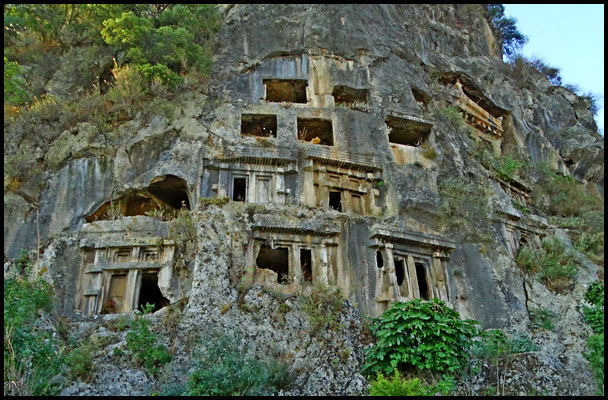 5. Exploring various Lycian Historic & Archeaological Sites
5. Exploring various Lycian Historic & Archeaological Sites
The Turquoise Coast is set along the fat bulbous … Peninsula that stretches between Antalya and Marmaris. The region was originally inhabited by the Lycians in 700-100 BC. They had several major and minor cities in the region as well as elaborate tombs carved high into the cliff walls, huge outdoor stone amphitheaters and other interesting structures.
Remains of various Lycian cities, cliff tombs and amphitheaters are scattered throughout the Turquoise Coast. They’re situated near beaches and rocky coastal areas as well as inland.
I greatly enjoyed visiting several Lycian sites during my explorations. I climbed up to intriguing cliff tombs at Kas, Dalyan and Fethiye. I walked around outdoor amphitheaters at Fethiye, Patara and Fetiye. I visited castle ruins at Kas and Kalkan. I also explored the Lycian’s main city ruins at Patara.
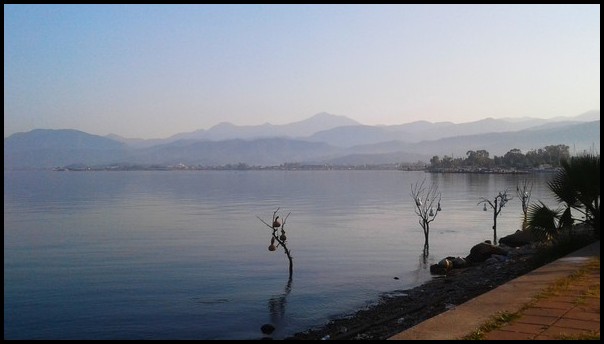 Fetiye and Area
Fetiye and Area
6. Walking Fetiye Waterfront
As I wrote in my detailed post about Fetiye, the small coastal city has a spectacular setting on a massive round bay with more than 10 km / 6 miles of shoreline stretching around the placid lake-like water. The stunning waterfront features several marinas, long landscaped parks with walking and cycling lanes, clusters of open-air restaurants & cafes and incredible, ever-changing views of the bay and distant mountain ranges.
While living in Fetiye for nearly two months, one of my favorite early morning activities was walking along the near-empty waterfront for 45 minutes to a small park with Weeping Willow trees, a large flock of resident ducks and a big white cat with a contrasting dark squirrel tail.
Once there, I’d eat my packed breakfast under a willow tree, play with the frisky cat and do yoga in the shade. Then I’d walk back home before the scorching summer heat set in around midday.
Quite luckily for me, my apartment was located just two blocks inland from the waterfront promenade, so I could walk to the beautiful bay any time within five minutes.
Sometimes I walked the waterfront in the other direction. That took me past a huge tour boats marina, a ferry pier for boats to the small island of Rhodes, Greece (closed this year due to Covid), past an upscale private yacht marina and around the southern end of the bay to another, much smaller marina and shipyard.
The bay-side walks were always so peaceful and beautiful that I never got tired of repeating them in the warm summer mornings.
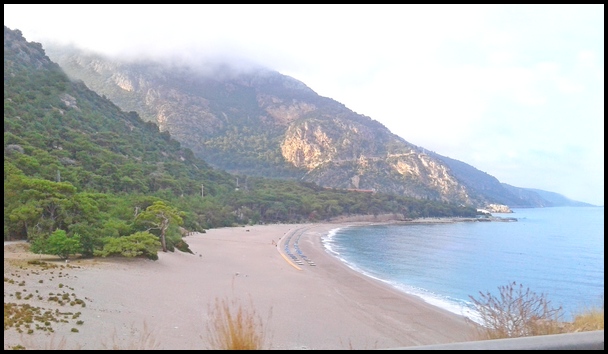
Kidrak Beach in early morning
7. Day Trips to Kidrak Beach
I visited plenty of beaches all along the Turquoise Coast. They ranged from tiny isolated beach strips to the very popular 8-km-long Konyaalti Beach in Antalya city and equally famous 4-km-long sand beach of Oludeniz near Fetiye.
Most of the region’s beaches consist of small oval stones, making sand beaches rather rare and especially famous. Most beaches have been very highly developed, now backed by long lines of open-air restaurants, cafes, bars and shops. Other beaches have been developed as ‘Beach Clubs’, privately-owned places that charge an admission fee and where the beach is jam-packed Math beach chairs and umbrellas, lound music blasts all day, and a restaurant/bar serves meals and drinks.
These seem to be Turkish’s peoples’ idea of a great beach. Luckily, a few undeveloped beaches and barely-developed national park beaches also are scattered along the coast.
Kidrak Beach is a medium sized, barely developed sand n pebble beach located a few km down the coastal highway from ultra-developed Oludeniz Beach. Kidrak Beach is set in a stunning location backed by a soaring bare rock mountain. Just behind the sand there’s a small forest of dense bushes and a few shady trees. At one end of the beach a low cliff rises, topped by a lovely pine forest with picnic tables set under the shade.
This beach is privately owned, which in this case works out exceedingly well as they’ve kept it as a very low-key place with quite minimal, tasteful development. They keep it all very clean (which must be a huge job given the Turk’s blatant littering in nature culture/habits), charge a very small admission fee (9 lira / $1.25 US) and close it down at 7 pm, long before visitors have time to start up rowdy drinking sessions and trash the place. Lol.
Probably a combination of the considerably more famous neighboring Oludeniz Beach, the admission fee, its slightly difficult to reach location and it early closing time keep Kidrak Beach less crowded than other beaches, even in high tourist season.
About once a week I catch the first 7 am bus out to Kidrak Beach, arriving at 8 am, long before anyone else arrives. I enjoy a relaxing breakfast and yoga session under the shady pine trees.
As people begin arriving, I shift over to the far end of the beach, where I perch myself at the best shady spot under a sole pine tree set back behind the beach. I take an invigorating 1-hour swim in the very cold sea then relax under the tree, eat my picnic lunch, take a short nap. By 1 pm Kidrak starts getting crowded in summer season, so I head back home by bus.
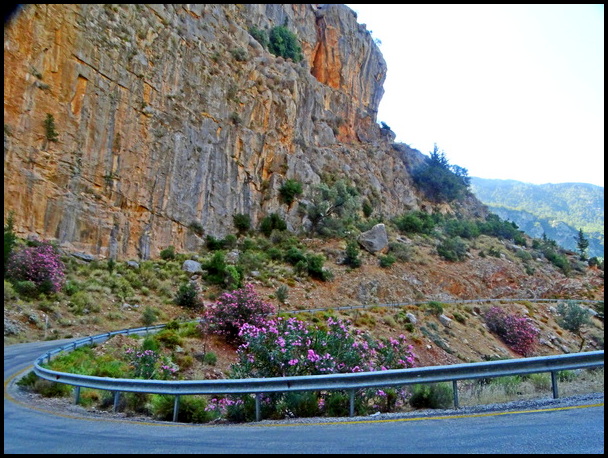 8. Coastal Highway between Oludeniz and Kabak
8. Coastal Highway between Oludeniz and Kabak
While the entire Turquoise Coast has stunning rugged scenery, perhaps the most dramatic and spectacular section of all is the steep winding road between Oludeniz (near Fethiye) and Kabak Bay.
I loved this coastal highway so much that I took the bus three times just to see the views and enjoy the thrill of the steep road with cliffs plunging steeply off to one side into the sea far, far below.
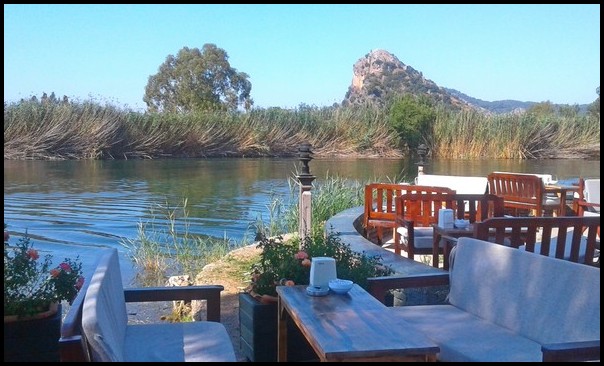 9. Dalyan River & Itzuzu Beach
9. Dalyan River & Itzuzu Beach
While most of the natural sites along the Turquoise Coast consist of dramatic cliffs, soaring mountains or deep gorges, the placid Dalyan River offers a completely different kind of natural beauty.
The slowly meandering, placid river winds through an absolutely flat plain from Koycegiz Lake out to the Mediterranean Sea. Along the way, it passes mostly through high dense grasses and wetlands. But here and there, rather randomly, are various tall limestone rock protrusions and some distant mountains.
Halfway between the lake and the sea, the tiny historic town of Dalyan is set on the shores of the river. The cute town has a wooden boardwalk through parkland set along the river and dozens of small tour boats waiting to take passengers out to the coast.
Where the river meets the sea, a long barrier sand island provides a stunning white sand beach. It’s tastefully run by the municipal park service, who’ve installed wood & thatch changing rooms, bathrooms, two open-air restaurants and a Muslim prayer hall.
While Dalyan town has been developed into a very low-key tourist town, filled with small boutique hotels, restaurants and shops, the main draw to Dalyan is a boat trip along the river out to Itzuzu Beach.
I visited Dalyan as a day trip from Fetiye, a 1.5-hour bus trip. Departing early int eh morning gave me plenty of time to explore the ultra-cute Dalyan town, enjoy a slow relaxing boat trip out to the beach, a couple of hours of beach & sea time as well as the return boat trip to Dalyan where I ate a tasty meal before returning to Fetiye. It was one of my favorite day trips.
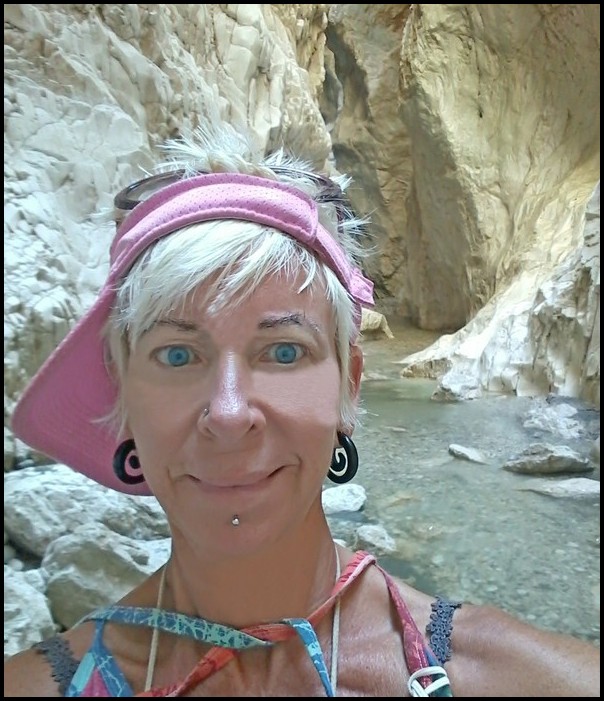
hiking through Saklikent Gorge solo in early morning!
10. Saklikent Gorge
Saklikent is a spectacular & very narrow river canyon located about one hour inland from the coast. It’s been designated a national park, so there’s a small admission fee of 9 lira / about $1.25 US.
Saklikent is also, quite unfortunately, very over-developed and famous, drawing gets ridiculous crowds in peak season. Online photos of the gorge generally show the canyon absolutely jam-packed with visitors. Eek!
Needless to say, that is not my idea of an enjoyable nature experience in the best of times, let alone during the Covid-10 pandemic. But the gorge looked so spectacular that I decided to take my chances by heading out on the first morning bus from Fetiye.
That proved to be even better than I’d hoped for. I was literally the only visitor at Saklikent Gorge when it opened at 8:45 am. I paid my admission fee and entered the canyon on the wooden walkway that’s been built into the side of the rock canyon, set about 10 ft above the raging river.
A short distance inside, the walkway ends on a small rocky plot of land. From there, visitors must walk through the ice-cold river up into the ever-narrow-ing gorge.
Soaring white cliffs, smoothed and polished by centuries of water action, rose around me on either side as I picked my way carefully over rocks, boulders, small stones and the icy river.
The depth of the water varied from ankle-deep to waist-deep, at which point I had to hold my phone and valuables overhead while carefully maneuvering the deeper pools. As I continued further in, the sheer rock walls slowly squeezed in closer and closer.
I continued as far as I could manage- until the water was so deep that I couldn’t proceed with my phone. At that point the canyon walls were close enough that I could stretch my arms out and touch both walls.
I turned back, walking more slowly down the gorge to admire the curving wall formations and surprising splashes of natural rock colorations. I passed only three other tourists making their way up the canyon. But when I reached the land outcrop, it was already getting crammed with visitors. Yikes! Time to leave!
I quickly made my way out and soon caught a bus back to Fetiye. I count myself extremely lucky to have hiked through Saklikent Gorge as the sole visitor that morning. It was an amazing experience.
You might also like:
All About Turkey’s Gorgeous Turquoise Coast
Cost of Budget Travel in Turkey 2020
==================================================


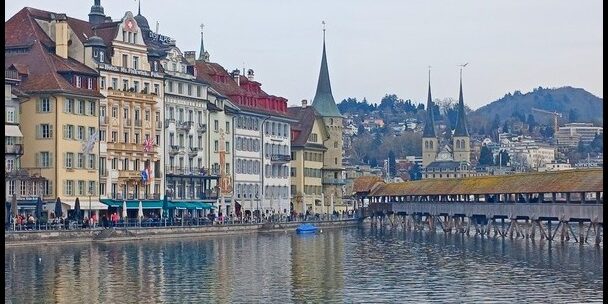
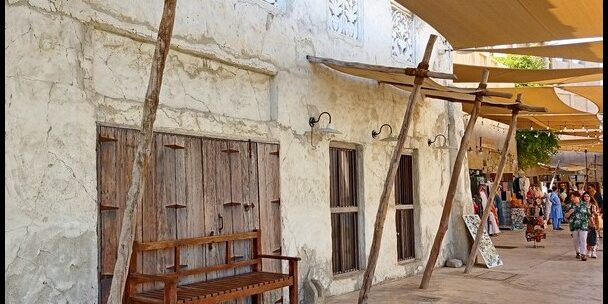

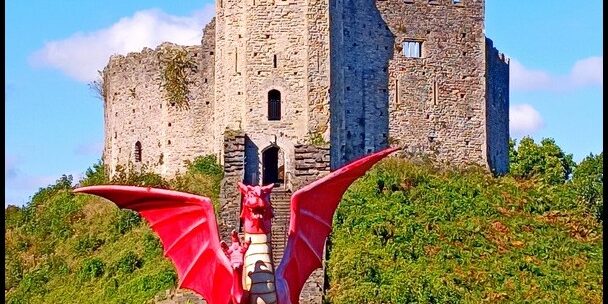


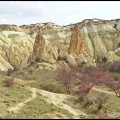
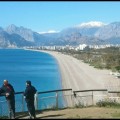

 Hi! I'm Lash, an American nomadic world traveler who's been traveling solo since 1998. I’m passionate about traveling the world nomadically and then sharing it all with you. I hope to inspire you to travel the world, to entertain you with tales from the road, and to help you reach your travel dreams. Welcome!
Hi! I'm Lash, an American nomadic world traveler who's been traveling solo since 1998. I’m passionate about traveling the world nomadically and then sharing it all with you. I hope to inspire you to travel the world, to entertain you with tales from the road, and to help you reach your travel dreams. Welcome! 


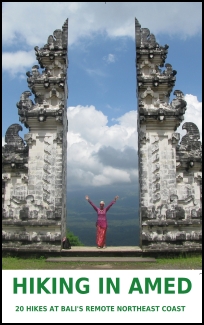
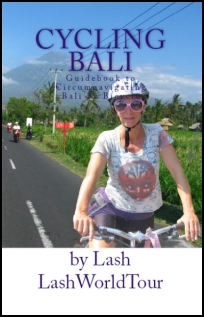
1 pings
My 12 Best Articles of 2020 on LashWorldTour - LashWorldTour
2021/01/26 at 9:10 pm (UTC 8) Link to this comment
[…] 6. My 10 Best Experiences on Turkey’s Gorgeous Turquoise Coast […]